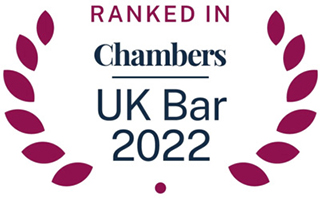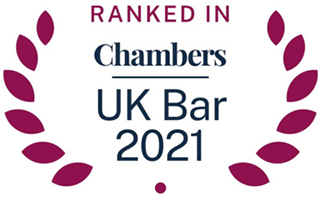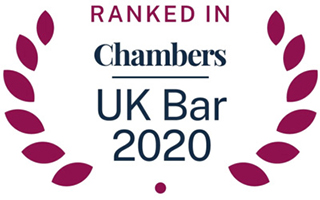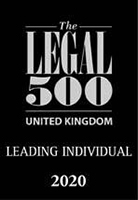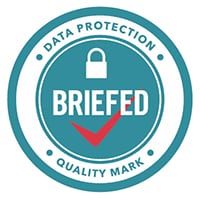Thank you for choosing to instruct me in your case. I will need to collect and hold your personal information in order to represent you. I will take all reasonable steps to protect your personal information. I will do all that I reasonably can to ensure I do not infringe your rights or undermine your trust. This Privacy Notice describes the information I collect about you, how it is used and shared, and your rights regarding it.
Data Controller
I am registered with the Information Commissioner’s Office (ICO) as a Data Controller for the personal data that I hold and process as a barrister. My registered address is Temple Garden Chambers, 1 Harcourt Buildings, Temple, London, EC4Y 9DA and my registration number is Z4641039.
Data Collection
All of the information that I hold about you is provided to me or gathered solely in the course of and for the purposes of your case, proceedings or any related matter.
Lawful Basis For Processing Your Information
The General Data Protection Regulation (GDPR) requires all organisations that process personal data to have a Lawful Basis for doing so. The Lawful Bases identified in the GDPR are:
- Consent of the data subject
- Performance of a contract with the data subject or to take steps to enter into a contract
- Compliance with a legal obligation
- To protect the vital interests of a data subject or another person
- Performance of a task carried out in the public interest or in the exercise of official authority vested in the controller.
- The legitimate interests of ourselves, or a third party, except where such interests are overridden by the interests, rights or freedoms of the data subject.
Examples Of Legitimate Interests
- Where the data subject is a client or in the service of the controller;
- Transmission within a group of undertakings for internal administrative purposes;
- Processing necessary to ensure network and information security, including preventing unauthorised access;
- Processing for direct marketing purposes, or to prevent fraud; and
- Reporting possible criminal acts or threats to public security.
My Lawful Basis is Legitimate Interest namely the provision of professional services to you and the proper exercise of my professional obligations and responsibilities. My Lawful Bases may also include: consent and/or performance of a contract with you or steps to enter a contract with you and/or compliance with a legal obligation. In so far as I process sensitive personal data that is necessary in relation to legal proceedings and/or obtaining legal advice and/or otherwise for establishing, exercising or defending legal rights and/or for administering justice.
I Use Your Information To
- Provide legal advice and representation;
- The efficient and professional management of my practice as a barrister;
- To investigate and address any concerns you may have;
- Assist in training pupils and mini-pupils.
I do not use automated decision-making in the processing of your personal data.
I collect and process both personal data and special categories of personal data as defined in the GDPR. This includes:
- Name;
- Email;
- Phone number;
- Address;
- Payment or bank details;
- Date of birth;
- Location details;
- Device IP address;
- Financial information;
- Medical Records;
- Employment Records;
- Criminal Records.
I May Share Your Personal Data With:
- My Instructing solicitors;
- My pupil or mini pupil, under my training;
- Opposing counsel and solicitors for the purposes of your case;
- A Court or other Tribunal;
- My Chambers management and staff who provide administrative services;
- My regulator or legal advisors in the event of a dispute or other legal matter;
- Other third parties where necessary to meet legal obligations;
- Any other party where I ask you and you consent to the sharing.
Transfers To Third Countries & International Organisations
I do not transfer any personal data to third countries or international organisations.
Retention
I retain your personal data while you remain a client and for as long as in necessary for me to meet my legal and professional obligations. My Retention and Disposal Policy (copy available on request) details how long I hold data for and how I dispose of it when it no longer needs to be held.
Your Rights
The General Data Protection Regulation gives you specific rights around your personal data. For example, you have to be informed about the information I hold and what I use it for, you can ask for a copy of the personal information I hold about you, you can ask me to correct any inaccuracies with the personal data I hold, you can ask me to stop sending you direct mail, or emails, or in some circumstances ask me to stop processing your details.
Finally, if I do something irregular or improper with your personal data you can seek compensation for any distress you are caused or loss you have incurred. You can find out more information from the ICO’s website and this is the organisation that you can complain to if you are unhappy with how I dealt with you.
Accessing & Correcting Your Information
You may request access to, correction of, or a copy of your information by contacting me in writing at my registered address.
Marketing Opt-Outs
You may opt out of receiving emails and other messages from my Chambers by following the instructions in those messages.
Cookies
Cookies are small text files that are stored on your browser or device by websites, apps, online media, and advertisements. The Chambers website use cookies to:
- Validate users;
- Remember user preferences and settings;
- Determine frequency of accessing our content;
- Measure the effectiveness of advertising;
- Analyse site visits and trends.
I May Update My Privacy Notice
When I make significant changes, I will publish the updated notice on my website profile.
Updated: 01/11/2022



